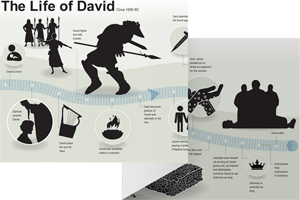The Future of Bible Study Is Here.
 Loading…
Loading…
You have not started any reading plans.
- More »
Sign in or register for a free account to set your preferred Bible and rate books.
31:1–13 In fulfillment of Samuel’s prophecy (see 28:19), Saul and his sons engage the Philistines in battle and are killed. The era of Saul draws to a close with their defeat at the hands of Israel’s archenemy. In the wake of Saul’s death, the narrative sets the stage for David’s monarchy and Israel’s finest hour. |
31:1 the Philistines were fighting against Israel Resumes the narrative from 29:11.
 Battles of Saul and David Table
Battles of Saul and David Table
31:3 he was badly wounded Saul receives a mortal wound.
31:4 these uncircumcised A pejorative title that Israel used to refer to the Philistines. Compare 14:6 and note; 17:26, 36.
make a fool of me In the ancient Near East, enemies often tortured captured royalty or high-ranking military officials as a display of superiority.
31:5 he also fell on his sword Perhaps he also feared being tortured and saw escape as unattainable.
31:6 Saul died, and his three sons Fulfills 28:19. For a parallel account, see 1 Chr 10:1–6.
31:8 they found Saul Armies usually promptly removed their slain dignitaries from the battlefield, but here, no one was left to take care of the bodies.
31:9 they cut off his head According to 1 Chr 10:10, the Philistines fastened Saul’s head to the temple of Dagon. Ironically, they replaced the head of their decapitated god with that of the king whose God decapitated Dagon (see 1 Sam 5:4).
31:10 the temple of the Ashtoreth Spoils of war were often deposited in the victor’s temple, as in 5:2. The Philistines do to Saul what David had done to Goliath (21:9).
 Astarte DDD
Astarte DDD
his corpse Saul’s body is decapitated and likely naked—the ultimate condition of shame.
31:11 the inhabitants of Jabesh Gilead Saul delivered these inhabitants in his only crowning achievement as king (see 11:1–11). As a Benjaminite, he may have been linked genealogically with them (compare Judg 21:10–14).
 Jabesh-Gilead AYBD
Jabesh-Gilead AYBD
31:12 burned them there This is not a normal Israelite custom. They may have done this to prevent further shame or desecration to the corpses.

|
About Faithlife Study BibleFaithlife Study Bible (FSB) is your guide to the ancient world of the Old and New Testaments, with study notes and articles that draw from a wide range of academic research. FSB helps you learn how to think about interpretation methods and issues so that you can gain a deeper understanding of the text. |
| Copyright |
Copyright 2012 Logos Bible Software. |
| Support Info | fsb |

